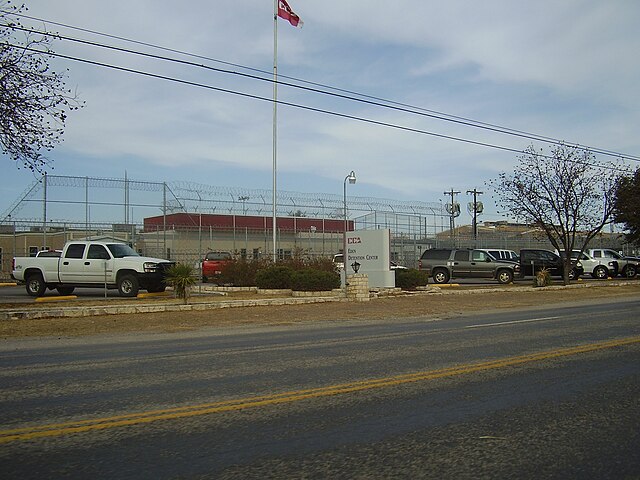
Eden Detention Center (CCA) in Eden, Texas. Photo by WhisperToMe, public domain via Wikimedia Commons.
Correcting corrections corporations of America
by Tom Sullivan
Eden Detention Center (CCA) in Eden, Texas. Photo by WhisperToMe, public domain via Wikimedia Commons.
The Justice Department yesterday announced in a memo it will begin to phase out its use of private prisons, concluding they are (according to the Washington Post) "less safe and less effective at providing correctional services than those run by the government." Good riddance. Now for Immigration and Customs Enforcement and the U.S. Marshals Service. And state prisons.
Washington Post:
Deputy Attorney General Sally Yates announced the decision on Thursday in a memo that instructs officials to either decline to renew the contracts for private prison operators when they expire or “substantially reduce” the contracts’ scope. The goal, Yates wrote, is “reducing — and ultimately ending — our use of privately operated prisons.”That report is here. Yates continued:
“They simply do not provide the same level of correctional services, programs, and resources; they do not save substantially on costs; and as noted in a recent report by the Department’s Office of Inspector General, they do not maintain the same level of safety and security,” Yates wrote.
“The fact of the matter is that private prisons don’t compare favorably to Bureau of Prisons facilities in terms of safety or security or services, and now with the decline in the federal prison population, we have both the opportunity and the responsibility to do something about that,” Yates said.Private prisons stocks got hammered after the announcement. Bloomberg reports:
Corrections Corp. fell 35 percent to $17.57 at the close of trading, the real estate investment trust’s biggest drop since its initial public offering in 1997. GEO Group plummeted 40 percent to $19.51, also the largest decline in its 22-year history as a publicly traded company. The stocks pared losses of about 50 percent as analysts said the impact may be less severe than initially expected. Corrections Corp. climbed to $18.85 in after-hours trading after saying that today’s decision relates to facilities that represent just 7 percent of its business. GEO Group rose to $20.72.Mark Joseph Stern writes at Slate:
[...]
While the federal government overall generated 51 percent of Corrections Corp.’s revenue last year, today’s action affects the Bureau of Prisons and doesn’t apply to U.S. Immigration and Customs Enforcement, which is part of the Department of Homeland Security and accounted for 24 percent of Corrections Corp.’s 2015 revenue, according to the company’s annual report. The Justice Department also oversees the U.S. Marshals Service, which accounted for about 16 percent of Corrections Corp. revenue.
Private prisons are often touted as a deal for taxpayers, and the industry has heavily promoted the notion that they are less expensive to the government than traditional facilities. This contention, however, appears to be a myth. While industry-funded studies have found that private prisons are marginally less expensive, independent analyses have arrived at a different conclusion: These facilities cherry-pick their inmates, housing the healthier ones and passing along the “high need” (i.e., more costly) prisoners to government-run prisons.Like charter school school companies. Another form of rent-seeking, this business model has always been obscene. Juleyka Lantigua-Williams observes at Atlantic:
Another set of concerns has to do with the private prisons’ business model. They make money from warehousing people, and will need to refill their buildings in order to remain in operation. Where will they find institutional or governmental clients who can generate and replenish the tens of thousands of bodies needed to fill their facilities?Don't let the cell door hit you on your way out.
There’s a great likelihood they will turn to states that don’t already employ them. The potential implications for states of entering into contracts with private prisons range widely. For example, there are serious financial considerations, as it costs more to house a prisoner in a private institution than in a public one. Marc Mauer, executive director of The Sentencing Project, attributes the use of private prisons with facilitating “the unprecedented growth in incarceration, particularly in the federal system.” He characterized their use as “a stain on our democracy” that allowed “profit-making entities to be handed the responsibility of making determinations of individual liberty.”